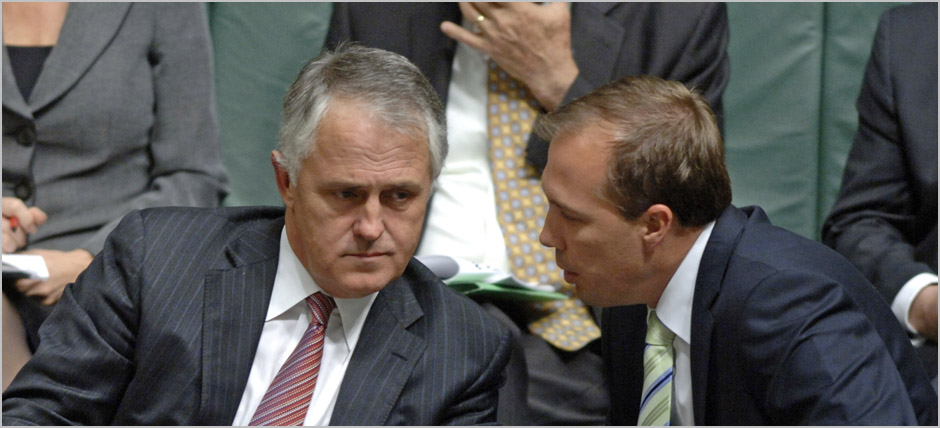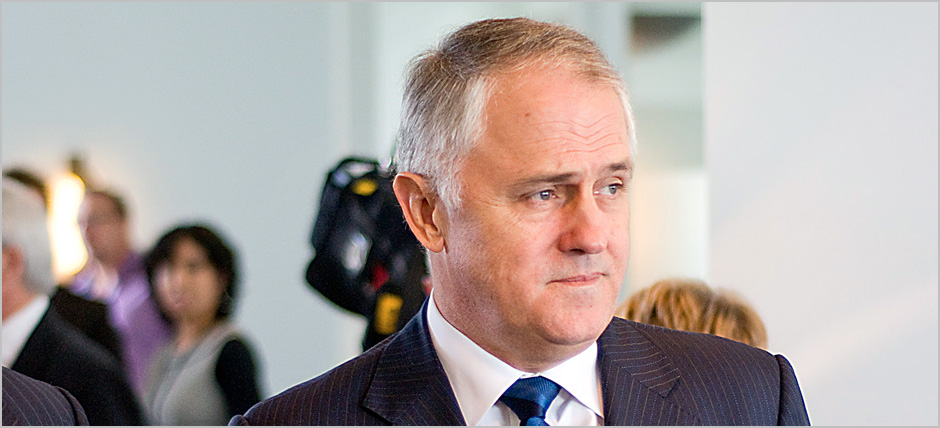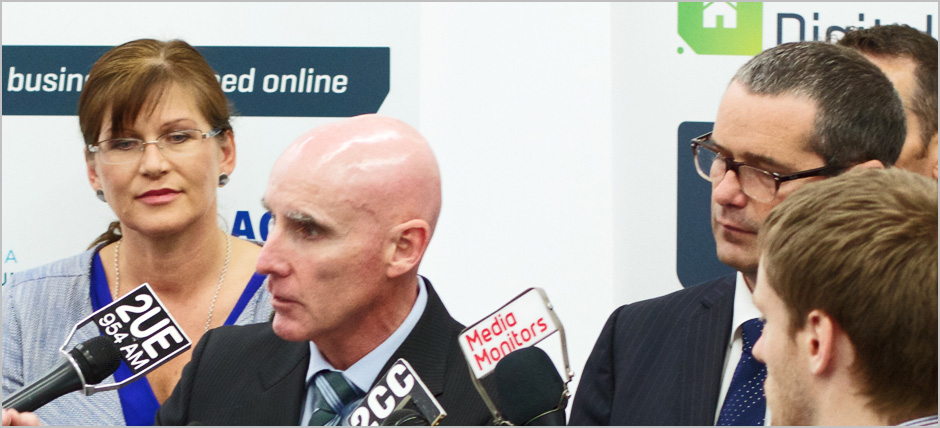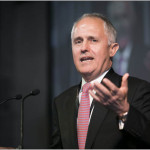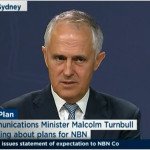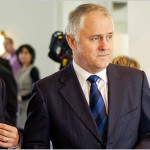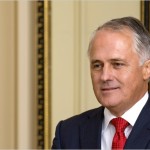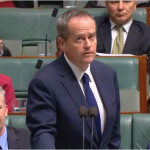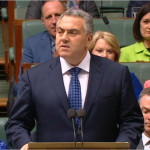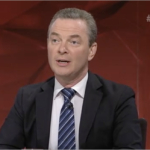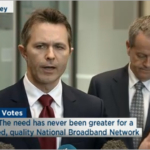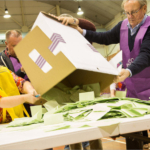Basic Govt IT needs a fundamental rethink
Government systems could be redesigned from the ground-up to make it easy to reorganise, merge and demerge departments, so that a person's email system can be rapidly and easily moved from one agency to another, or the HR information of two departments can be consolidated in a merger at low cost.
Has Gov 2.0 in Australia gotten too boring too fast?
So has Gov 2.0 become boring too fast in Australia? Shouldn't we see more conversation, more voices, more blogs, more tweets, more people packing out events seeking the latest information in what is one of the most rapidly changing environments in history - the internet?
The only way to fix copyright is to make it fair
Everyone knows there’s a problem with copyright. Artists get paid very little for their work, and legitimate consumers aren’t getting a very fair deal either. Unfortunately, nobody agrees about how we should fix it.
A voice in mainstream media on NBN
Senior Victorian IT professional George Fong encourages fellow technologists to get involved in commenting on the National Broadband Network, after the success of a segment he was involved with on 3AW last week.
Connecting to Australia’s first digital technology curriculum
Australia finally has its first digital technology curriculum which is mandatory for all Australian children from Foundation, the name replacing kindergarten, to Year 8.
Turnbull’s MTM CBN should not be a monopoly
The only way for Labor's all-fibre National Broadband Network to sensibly function was for it to be a legislated infrastructure monopoly. But the Coalition's watered-down, multi-technology alternative is a very different kettle of fish, and consumers will clearly benefit if rival telcos such as Telstra, Optus and TPG are allowed to overbuild portions of the network.
Tasmania’s NBN tangle is a shocking mess
The ongoing stoush over how the Coalition's Broadband Network should be deployed in Tasmania shows Australia's broadband tangle at its worst: Construction contractors who don't deliver, overly optimistic promises and estimates, and politicians playing petty power games with a highly important national infrastructure project. No matter which way you look at it, it's a shocking mess.
Will hidden taxes and competitive pressures make the NBN unsustainable?
Is the National Broadband Network sustainable? I do not mean this in a technical sense. While I am wary of the government using taxpayers' money to ‘pick winners’ in technology, there are many people better placed than I am to crystal ball gaze into the best technology for the internet. Rather is the NBN economically sustainable?
Why no consumer voices for Turnbull’s ministerial council?
Communications Minister Malcolm Turnbull's new Ministerial Advisory Council last week features representatives from virtually every major Australian telecommunications company of any note. But the group most important to the future of the Australian telco sector -- consumers -- appear not to have been invited.
Apple iTax: Made in Ireland, designed in the US
Apple, famous for its innovative products, is equally creative in its tax structure. From 2009 to 2012, it successfully sheltered US$44 billion from being taxed anywhere in the world, including sales generated in Australia.
Five ways NZ is smarter than Australia on broadband
In Australia, poking fun at our New Zealand cousins has become more than just a hobby over the years; these days it enjoys the status of a national sport. However, when it becomes to broadband, the situation has been turned on its head: New Zealand is doing everything right that we are doing wrong. Here's five ways the Kiwis are smarter than us in this critical area.
Will Australia meet its April 2014 Open Government commitment?
Will Australia join Russia, becoming the second nation to withdraw? Or will it simply delay membership - one year, two years or more? Perhaps we'll find out with a government announcement in the next month regarding its OGP commitment. Or perhaps all we can expect is ongoing silence.
The end is nigh for Windows XP: Are you ready?
Almost 13 years after its release in October 2001 to a world still in shock after the 9/11 terror attacks, the sun is finally setting on Microsoft’s Windows XP. The operating system has been the software in many home and work PCs but for die-hard users who continue to use XP, danger that way lies.
Don’t sue us for search: Google’s unnecessary safe harbour appeal
A brief review of the history of Australian safe harbour legislation and recent ISP-related case laws in the US shows the best way to provide legal certainty for online intermediaries would be to introduce “fair use” exceptions alone. More safe harbour rules aren’t needed at this stage.
The great NBN sell-off has already begun
NBN Co, we hardly knew ye. Make no mistake: Tony Abbott's new Coalition Government does not want to own a national broadband monopoly. The process of selling NBN Co to the private sector has already begun, and will be accelerated over the next several years.
Has Labor already given up on its NBN?
The new Coalition Government appears dead set on drastically winding back, modifying, selling off or otherwise destroying Labor's comprehensive National Broadband Network vision. But the party which started the project in the first place appears to have already given up fighting this demolition job, with the exception of dogmatic former Communications Minister Stephen Conroy.
Before this decade is OUT: What if the “giants of the web” designed government...
What have we learnt from the past decade of "government online"? And what could we learn from the giants of the web? This is an examination of how an understanding of complex systems, risk and common patterns can be applied in an economy-wide effort of breakthrough innovation to drive the digital transformation of government service delivery over the next decade.
“Destructive forces” unravelling NBN, says Budde
"Destructive forces" at work in a "highly polarised political environment" are starting to "unravel" Labor's National Broadband Network project, veteran analyst Paul Budde said yesterday, with the new Coalition Government having boxed itself into a corner on the issue and end users set to suffer from a nightmarish situation akin to a "Pandora's Box" of problems.
The politics of unshackling the NBN from politics
A long-term industry has been shackled to three-year political terms for far too long. The only way to unshackle NBN from politics is to get government out of the marketplace where it exists. Of course, the legacy of sunk costs will make this difficult. But by the time we stop bickering about the latest lot of reports, it will be time to deal with the next communications technology problem.
Coalition to adopt UK broadband platform
Communications Minister Malcolm Turnbull has confirmed plans to implement the same underlying broadband infrastructure platform in Australia which has already been used for some time in the UK, with the two nations' incumbent telcos Telstra and BT to collaborate on the exchange over the next several years.
Vodafone should buy iiNet before TPG can
The exit of Michael Malone from the company he founded 20 years ago has re-opened long-running speculation that top-tier broadband player iiNet could be acquired, and it's a valid idea. But the telco most suited to buying the powerhouse from Perth is not hostile rival TPG; it's ailing mobile telco Vodafone, which still has plenty of cash up its sleeves.
Successful telco regulation means a light touch
The demand this week by academic Michael de Percy for Australia's politicians to cease their chaotic struggle over the nation's telecommunications sector and let it get on with its own business shouldn't be seen as controversial. The best regulation in any sector takes a 'light touch' approach and this troubled industry is no exception to that rule.
Building a financial system for a cashless age
If the Financial System Inquiry is to achieve its aim of helping to promote growth and productivity in the Australian economy it will need to focus strongly on electronic payments.
We’re running out of wireless spectrum … so what can we do?
Australia is in a prime position to address the challenges and develop world-leading applications for ubiquitous wireless connectivity. The pedigree of our wireless laboratories and researchers in all parts of the country is second to none.
The NBN must have a cost/benefit analysis (October 2010 re-print)
This article by Communications Minister Malcolm Turnbull first appeared on Delimiter in October 2010, shortly after Turnbull was appointed Shadow Communications Minister. Delimiter re-prints this article today for the edification of readers, in light of the news that Turnbull has approved NBN Co to go ahead with the controversial ‘Multi-Technology Mix’ option for its broadband rollout, despite the fact that the cost/benefit analysis being conducted into the project will not be completed until the middle of 2014.
I don’t know how to cover the NBN anymore
Australia's National Broadband Network project is now in uncharted territory. Beyond a joke, beyond a politicised mess, and even beyond farce, the incredibly inconsistent handling of the project by Liberal Communications Minister Malcolm Turnbull has led it far outside the bounds of rational discourse or intelligent consideration.
Gary McLaren’s last email to the NBN troops
Yesterday the National Broadband Network Company revealed it had made its long-time and respected chief technology officer Gary McLaren and several other senior executives redundant. This email was sent by McLaren to staff at NBN Co.
House Foxtel: Unbowed, Unbent and Unreasonable
The argument by pay television giant Foxtel that the launch of its new Play IPTV streaming video service will cause Australians' objections about the lack of legitimate access to popular shows such as Game of Thrones to "vanish" is nothing short of ridiculous and strongly indicates that the company still has no idea why the nation is so frustrated with it.
Europe says no to data retention, so why is it an option in Australia?
Last week the Court of Justice of the EU (CJEU) ruled that data retention regulations, as they currently stand, are not in accordance with EU law and the European Parliament voted in favour of introducing net neutrality into EU telecoms regulation the week before. As Australia is currently in the midst of a data retention inquiry – the second in three years – what effects will this ruling have on the debate?
NAB’s Bitcoin ban a symptom of the digital currency threat
Virtual currency Bitcoin is not a subject that ever draws neutral reactions. Against those who see the radical possibilities of a frictionless payment system designed for the internet, there is a growing resistance to the currencies that threaten existing business models and the perceived traceability of our current currency systems.
As laptop scheme ends, what next for families and learning?
The computers for schools program, which involved federal funding for the supply of laptops to high school students, is set to end in June. The program was a central piece of the former government’s “digital revolution” but is being discontinued by the current government. The end of the program is already having consequences for schools and for families.
Neither AT&T nor Turnbull are telling the whole truth
The local debate over AT&T's plans to deploy gigabit fibre to 100 US cities starkly demonstrates that neither giant telcos nor the politicians regulating them can be trusted to give Australians 100 percent of the truth about how next-generation broadband infrastructure rollouts are being or should be deployed.
Energy-smart appliances cut Australian power bills by billions
The latest review of Australia’s energy-saving appliance scheme has delivered a rare trifecta: a good news story for the economy, the community and the environment. According to my estimates from data in the Department of Industry review, the value of energy saved in Australia last year alone was around A$3.2 billion. Of this, some A$2.7 billion was saved by households.
Free to fail: Why corporates are learning to love venture capital
Opening a venture capital branch seems to be the new “thing” in the corporate world. While Telstra and Westpac are the new big national players, Google is clearly ahead of the curve, with two distinct venture capital firms: the newly launched Google Capital and the five-year-old Google Ventures. But why are so many companies, across a range of sectors, now running to open their own venture capital funds?
Why is Microsoft dropping support for Windows 8.1?
In a move certain to raise the ire of users of Microsoft’s Windows operating system the software giant has announced that next month it will cease support for Windows 8.1. But that operating system is barely eight months old and already an upgraded version of the Windows 8 system that failed to impress many users since its release in 2012.
Scrimp now, pay later: CSIRO cuts could stifle long-term research
The moment we tie short-term political, economic or social goals to science is the moment we ensure we’ll slow down finding those momentous future breakthroughs that science has brought us. It is a paradox, but one that the government needs to understand before cutting big budgets out of long-term fundamental research programs at the CSIRO.
Stop the pirates? Behind Brandis’ copyright crusade
The lack of hard, unbiased research driving this debate on piracy, as well as the privileged access to the Attorney General that entertainment industry lobbyists seem to have, does not bode well for robust, evidence-based policy being adopted in the near future.
Only at the movies? Home truths about cinema ticket pricing
In the last fortnight, senior executives from cinema operators in Australia, including Village Roadshow and Palace Cinemas, have come out defending their decision to raise movie ticket prices. But do their arguments hold water?
Labor’s NBN is a natural monopoly, but the Coalition’s is not
The argument made by respected competition expert, academic and executive Fred Hilmer several weeks ago that the National Broadband Network is not a "natural monopoly" is somewhat convincing, but ultimately falls short by failing to acknowledge specific factors relevant to competition in the telecommunications sector.
Lock down cybersecurity or face another Heartbleed – or worse
The recently released Commission of Audit report recommends that the Australian government needs to become “digital by default”. The continued shift to digital service delivery is intended to reduce costs, improve quality of service and provide greater transparency. But it will also open up new vulnerabilities to cyber attacks that could be used to access secure and confidential data, compromise the integrity of trusted authorities and disrupt critical services.
Reboot ICT teacher training to halt the computing brain drain
The shortage of computing experts in Australian schools has serious implications for our future as a player in the knowledge economy.
Commission of Audit: Digital disruption needed (business as usual not an option)
What does it take to deliver on a digital transformation agenda that the National Commission of Audit has explicitly described as “not business as usual”? As we transition from a 60 to 100 year old operating model of government, a fundamental re-imagining of what is meant by “public service” is needed.
Anti-piracy lobby still suffering from self-delusion
Most Australians understand that the only solution to the nation's record Internet piracy rates is for the film and TV industry to follow the music, book and gaming sectors and make their content available online in a timely, affordable and convenient manner. But that's a truth rights holders and their lobbyists seem unwilling to accept.
Budget 2014: What now for the NBN as taxpayer investment is capped?
NBN Co CEO Bill Morrow now faces some difficult decisions in deciding how best to allocate resources to meet the objective of providing high-speed broadband across Australia. Since the Coalition’s election in September last year the NBN has been subject to a number of reviews and a wholesale clean out of management. With many reviews, such as the cost-benefit analysis, yet to report, the strategic direction for NBN Co is uncertain making it difficult to comment on future developments with accuracy.
Budget 2014: No country for new games
Cutting off the Games Fund demonstrates that the Liberal government has no interest in supporting an existing vibrant and maturing creative industry. Attacking the younger and lower classes of the nation by gutting a wide range of social services demonstrates that the Liberal government has no interest in the creative and cultural future of the nation.
A cashless society and the five forms of mobile payment that will get us...
Visions of a cashless society started being portrayed from the 1950’s along with other aspects of a future waiting to be transformed by technology. That future has not yet arrived but it is now possible to exist without using cash on a daily basis. In fact, in a survey released this week, 25% of Australians claim not to use cash in a given month. In the US, 50% of Americans carry less than $20 in cash at any time.
CommBank’s deep innovation is redefining our notion of what a bank is
The remarkable wave of technological innovation emanating from the Commonwealth Bank of Australia is forcing Australians to redefine their fundamental concept of what a bank is, and reimagine what their basic relationship to such an institution should be.
The ‘myth’ of the Australian entrepreneur
A better understanding of the realities of entrepreneurial life in Australia will lead to better informed industry policy, and perhaps increased support for an ecosystem that is a key driver of future growth and development for Australia.
US Chinese military charges a smokescreen for its own spying
In a surprising move, a US District Court has charged five members of the Chinese military with hacking six US companies to obtain commercial secrets over the last eight years. The move has been denounced by the Chinese government and the US Ambassador has been called to Beijing as a result.
Morrow must receive the dignity that Quigley never did
Those opposed to the Coalition's rival broadband policy must not step over the line into offensiveness in their pursuit of NBN Co chief executive Bill Morrow over past failures at US utility Pacific Gas & Electric. The better path of valor would be to treat Morrow with the same level of respect and dignity that his predecessor Mike Quigley deserved, but never got.
Australia can’t stop multinational profit shifting in isolation
In a global economy it is logical that companies would want to structure their business to take advantage of beneficial rules in different countries. And equally each country will want a competitive corporate tax system to attract and retain economic activity. However, the policies of one country should not undermine the policies of another or cause them economic harm. Organisations such as the G20, EU and OECD must enable cooperation to make sure that countries are in agreement with each other’s policies and to pressure those countries whose policies are disadvantaging their neighbours.
In the Airbnb world we need a new productivity measure
Our productivity problem is a like an epidemic. It affects many businesses and threatens the prosperity of future Australians yet it is poorly understood and goes largely unnoticed, especially in a service economy. If a problem of this size and scale were to affect people’s health, money would be raised for further research to isolate the causes and cures for the malady.
The ABC must now deal with its NBN problem
Over the past month, the evidence has become overwhelming that the ABC is actively censoring coverage of the National Broadband Network issue in a way that runs counter to the public interest. The broadcaster must now face the issue squarely and deal with it head-on, or run the risk of losing credibility with its highly informed and vocal audience.
Broadcast to Chromecast – is TV being recast or cast out?
I expect more from the biggest screen in my house and, once again, traditional mass media have failed to deliver.
Valleys, alleys and roundabouts: Innovating beyond a precinct
In Australia, the Australian Technology Park in Sydney, Parkville Knowledge Precinct in Melbourne, and Kelvin Grove Urban Village in Brisbane are certainly emerging urban knowledge precincts.
The NBN is in a regulatory hole: Time to stop digging
As the saying goes, when you are in a hole, stop digging. The NBN is looking like a large pit, and at present, everyone is digging in deeper.
Budget a harsh wake-up call for the tech sector
Listening to the shrieks and squeals of tech sector commentators over the past few weeks, you’d be forgiven for thinking Joe Hockey’s first budget contained nothing for the industry. A more measured inspection of the budget entrails and you will find the Coalition has delivered a lot. A lot of pain, and a lot of lessons.
It’s nice to see government agencies share with each other
One of the most frustrating and, I think, silliest things I found when working in Australian government agencies was how almost every department, agency and statutory body developed almost all of its own policies, procedures, software and tools.
Small business missing the mobile, social, cloud revolution
Most companies that live and breathe the online revolution are not tech startups, but smart smaller firms that use online tools to run their core business better: to cut costs, reach customers and suppliers, innovate and get more control. Many others, however, are falling behind, according to a new Grattan Institute discussion paper.
Australia Post, Telstra and the ‘dying business’ dilemma
Who would run a former government-owned monopoly these days? In the last week, Australia Post’s Ahmed Fahour announced 900 administration jobs were to go from its Melbourne operations, while last week Telstra’s David Thodey recounted discussions from his recent trip to the US, where he was told his “business model is dead”.
Snowden report calls out Australia’s inadequate privacy law
The revelations of NSA whistleblower Edward Snowden have altered the way we think about accountability, transparency and the rule of law with regard to both the activities of security agencies and the value of privacy, according to a detailed report released this week. But this change in thinking has not led to practical reform, according to the report.
Corporate highs: The US P-TECH model for schools in Australia?
Prime Minister Tony Abbott visited a P-TECH (Pathways in Technology Early Career High) school in New York last week, hinting it’s a model of education we should consider implementing in Australia. The school, partly funded by IBM and training students to suit the company’s needs, is different to anything we have in Australia. While the P-TECH model would be feasible here, the model risks confusing economic needs with educational ones.
Australia’s got ICT talent: So how do we make the most of it?
AUSTRALIA 2025: How will science address the challenges of the future? In collaboration with Australia’s chief scientist Ian Chubb, the Conversation is asking how each science discipline will contribute to Australia now and in the future. Written by luminaries and accompanied by two expert commentaries to ensure a broader perspective, these articles run fortnightly and focus on each of the major scientific areas. This instalment takes a look at ICT’s role.
‘Google Schmoogle’ – how Yellow Pages got it so wrong
Yellow Pages directories have been appearing on doorsteps across Australia in recent weeks. As often as not, they go straight into the recycling bin. In the world of the internet and e-commerce, the very notion of a book the size of two bricks being the source of valuable purchasing information seems plain silly.
We like e-readers – but library users are still borrowing books
What place do e-readers – and in particular ebooks – hold in the reading behaviour of Australia’s 10 million public library borrowers? There are some 181 million items loaned every year by the nation’s 1,500 public libraries, branches, mobile libraries and other service points but, according to the latest survey-based report from the Australian Library and Information Association (ALIA), for the majority of these libraries, ebook loans represent less than 1% of the total.
How Australia got online 25 years ago
It is a quarter-century since Australia first connected to the internet, but this technological breakthrough had a long gestation. What is now a global phenomenon was once the property of an exclusive community.
‘Digital play’ is here to stay … but don’t let go of real Lego...
Ensuring access to both physical and digital methods of building block construction where children can move freely from one to another is crucial for their development in the early years.
One step forward, two steps back: Govt cloud policy displays classic ignorance
The Federal Government has taken many positive steps forward in the past year with respect to freeing up its departments and agencies to adopt the new class of cloud computing technologies. But the release of an overly bureaucratic policy this month on offshore data storage has the potential to set that progress back substantially, relying as it does on several outdated concepts of risk management in IT projects.
Big Red Button: How NBN Co’s launch events are unfairly fuelling Labor’s election campaign
NBN Co's constant stream of launch events is providing Labor with a massively uneven platform to promote its broadband policy and very likely breaches the Government's Caretaker Conventions.
Turnbull’s first 100 days: Tough times ahead for a new Minister
If the Coalition wins, the first 100 days of Malcolm Turnbull’s tenure as Communications Minister will be incredibly gruelling, with a laundry list of tough action items a mile long.
I’m mad as hell, and I’m not going to take this anymore. Let’s fix...
For far too long, Australia's political sector has gotten technology policy completely wrong. I'm mad as hell, and I'm not going to take this anymore. Let's take Delimiter into the Canberra Press Gallery and literally write the book on tech policy while we're there.
Delimiter (draft) Statement of Principles
As regular Delimiter readers will know, I have made mistakes in the past. Not all of the articles I have written have been on...
Wow! What a week. Humbled, but still nervous. 15 percent to go: Will we...
We still need about $3,700 to successfully fund the project, and although contributions are still coming in, they have obviously slowed down substantially from the incredible first couple of days of the project. I will need to continue momentum if The Frustrated State is to be funded. And Kickstarter is an all-or-nothing model – if we don’t hit our target, I won’t receive any funding for the project.
Holy cow: The Frustrated State was funded in only a week and I’m still...
This book will be a major step taken by Australia's technology community as we reboot our politicians' understanding of technology policy. It will not be the only step, but it will be one of the first. I look forward to taking it together with all of you.
Revised Delimiter Statement of Principles
Hi everyone,
welcome back! Delimiter starts publishing again today, and from today I'm also commencing work on my technology policy book, The Frustrated State. It...
Labor will abandon its FTTP NBN policy
There is absolutely no doubt that the Australian Labor Party will abandon its Fibre to the Premises National Broadband Network plan and adopt the Coalition’s alternative Multi-Technology Model as official policy before the next Federal Election.
Hoist by his own petard: How Labor can take on Turnbull
To a Federal Labor Party exhausted from several bitter years of internal struggle and a vicious election campaign, it must seem like slipping into Opposition might be a good chance for a hard-earned rest. But the truth is that the long fight to keep one of its key policies intact has just begun. Here’s some ideas for how Labor can take on Communications Minister Malcolm Turnbull on the National Broadband Network issue — and win.
NBN Co must consider more aerial fibre deployments
NBN Co's Strategic Review process gives the company an unmissable opportunity to re-evaluate the early decision to deploy its FTTP network primarily through Telstra's underground ducts. The company and its new Coalition masters must now seriously consider deploying more fibre aerially on power poles in an effort to speed up its rollout substantially.
Intelligence apologists fast running out of excuses
Politicians from Australia's major parties need to stop issuing ludicrous blanket pardons for the intelligence community's ongoing misdemeanours and start applying a basic modicum of transparency and accountability to this important national security function.
Quigley was right: NBN Strategic Review shows FTTP still cost-effective, viable
A close reading of NBN Co's Strategic Review report published last week shows the former chief executive of the company was overwhelmingly correct: A predominantly Fibre to the Premises National Broadband Network can still be rolled out with only modest cost and timeframe implications. But that's a truth that nobody currently involved in the process seems to want to hear.
Forget ‘cloud-first’: Australia’s public sector is following the globe into ‘cloud-only’
Burned by a decade's worth of failures of major on-premises IT projects, 2013 was the year that Australia's State Governments almost universally declared they would take a "cloud-first" approach to IT procurement. But there are already signs that the next stage of this process is underway, and that "cloud-first" may inevitably become "cloud-only".
Foxtel is becoming a content monopolist
The decline in power of Australia's free to air television networks and the failure of IPTV players to enter or grow substantially in the local market have left pay TV giant Foxtel with an incredibly strong position in the nation's content landscape. As some industry executives have feared for years, the company is now on the verge of becoming a content monopolist.
SPC Ardmona: Let’s replace these tin cans with high fibre
The Federal Government's decision to reject a $25 million plea for financial assistance for SPC Ardmona's troubled fruit processing plant in Shepparton should be seen in the context of the long-term and very necessary war to lessen the reliance of Australia's economy on legacy industries and to push it towards the next-generation of knowledge-based smart businesses.
Older Australians embracing video games
Over the past decade, stereotypes that video games were a popular medium intended only for youths have been eroded. It is clear that video games are also a popular medium for adults.
Microsoft wants to win you back with Windows 10
The latest version of Microsoft’s Windows operating system will begin rolling out from Wednesday (July 29). And remarkably, Windows 10 will be offered as a free upgrade to those users who already have Windows 7 and 8.1 installed.
What it means: Five key points from the Senate’s Digital Currency report
Last week the Senate Standing Committee on Economics handed down a detailed report following its inquiry into Australia’s emerging digital or crypto-currency sector. The release was hailed as a “watershed” moment for this financial technology — here’s why it matters, in five succinct points.
The Senate NBN Committee should interview MyRepublic
The interjection by Singapore’s MyRepublic into Australia’s broadband debate this morning may have been inflammatory and used mildly offensive adult language. But there are some fundamentally good points being made by the upstart telco. The next step should be for the Senate’s NBN Committee to interview its chief executive in person.
Foxtel’s bundle of pain could come sooner than it thinks
This whole business model is now under challenge; for newspapers, TV channels and for pay TV. The share prices of media companies are in decline, and in the US in sharp decline.
Fact Check: Is ridesharing no safer than hitchhiking?
The claim that ridesharing is no safer than hitchhiking is not supported by empirical data. Much of the data used by critics of Uber rely on anecdotal data and media reports to support their view ridesharing puts passengers at personal risk.
What now after the Dallas Buyers Club pirate claim is rejected as ‘surreal’?
Time and again, Australians have shown they are willing to pay for reasonably priced and accessible content. Copyright owners who try to extort money from downloaders are going about this the wrong way.
A change in Australia’s web rules would open up the .au space
If you want to register an Australian web address, your options may be about to change due to a review of domain name policy that is currently underway.
The ACCC has killed off Australia’s broadband competition
The ACCC’s move to allow TPG’s buyout of iiNet is an appalling decision which will finally complete the long-running, gradual death of actual competition in Australia’s broadband market. The tragedy of the situation is that the well-meaning regulator has nevertheless contributed to the process at several key points along the way.
Hockey’s IP inquiry another opportunity likely to be missed
Australian Treasurer Joe Hockey has asked the Productivity Commission to undertake a wide-ranging review of Australia’s intellectual property regime. The review is an opportunity for an increasingly distracted government to set its stamp on the Australian economy for the next 20 years. It is an opportunity that will almost certainly be missed.
I WANT MY IPAD! Are our kids getting addicted to technology?
Are toddlers really becoming addicted to technology? There’s certainly a lot of media hype to suggest that they are. And there’s no question the footage of small children breaking down when their tablet is taken away is unsettling.
We must determine how the $15bn NBN cost blow-out occurred
The full resources of the Federal Parliament and other Government accountability mechanisms must be deployed to determine how a cost blowout of between $5 billion and $15 billion was allowed to occur in the National Broadband Network, and how to stop a similar situation from occurring again in future.
Break up the NBN? Wow. How about we actually build the damn thing first.
The National Broadband Network should not be broken up into smaller parts. It should not be set up to compete with itself. And it should most definitely not be sold off to the private market. There is only one thing that the Government should do with the NBN. It should damn well get on with the job of building it.
Turnbull’s NBN: Why it’s slow, expensive and obsolete
The Coalition sold the Australian public a product that was supposed to be fast, one-third the cost and arrive sooner than what Labor was offering us. Instead the Coalition’s NBN will be so slow that it is obsolete by the time it’s in place, it will cost about the same as Labor’s fibre-to-the-premises NBN, and it won’t arrive on our doorsteps much sooner.
Rod Tucker’s right: Turnbull’s MTM model will leave Australia behind
University of Melbourne academic Rod Tucker attracted strident criticism this week for his claim that Malcolm Turnbull’s Multi-Technology Mix approach to the National Broadband Network will result in Australia remaining an “Internet backwater”. However, the unfortunate reality is that Tucker’s comments are all too accurate.
Malcolm Turnbull was Australia’s worst ever Communications Minister
He might be charismatic, he might be popular, and pretty shortly he might be Prime Minister. But when it comes to technology policy, Malcolm Turnbull has been a disaster. The Member for Wentworth will be remembered as Australia’s worst ever Communications Minister — the man who singlehandedly demolished the NBN and put a polite face on draconian Data Retention and Internet piracy laws.
Now it gets interesting: Australia has its first digitally literate Prime Minister
Australia has never before in its history had a digitally literate Prime Minister of the likes of Malcolm Turnbull.
Forget it: Turnbull won’t return the NBN to a FTTP model
Prime Minister or not, there is simply no way that Malcolm Turnbull is going to reverse five years of bitter campaigning and return the National Broadband Network to its previous near-universal Fibre to the Premises model. So let’s give up hope on that misguided delusion right now and save ourselves a great deal of painful mental anguish.
Commonwealth Bank gets on board with the blockchain
In an attempt to ride the tsunami of disruption that is reshaping the financial services industry, Commonwealth Bank of Australia has joined forces with eight major banks to develop applications based on blockchain, the technology underpinning Bitcoin and the other cryptocurrencies.
myGov has potential but is far from finished
MyGov – or something like it – is part of a 21st century government. It is the way of the future. But it needs careful development, testing, and selling.
They did it
From this day on, whenever Australian engineers are facing a tough task, they should look up into the skies and remind themselves of the power of the Australian mind. If Australian ingenuity can put such a hunk of incredibly complex communications infrastructure into orbit to serve our broadband needs, purely on the strength of some clear thinking and a lot of hard work, then we truly can do anything. And we will.
Five things you need to know about the Trans-Pacific Partnership
This article is by Charis Palmer, Deputy Business Editor at The Conversation. It originally appeared on The Conversation.
After eight years and 19 rounds of...
How the NBN could boost Australia’s GDP by 2 percent
This article is by Leith Campbell, Honorary Fellow, Melbourne School of Engineering and Sascha Suessspeck, Economist and Ph.D. Electronic and Electrical Engineering student, both...
A code of ethics in IT: just lip service or something with bite?
The emissions scandal that has rocked the car maker Volkswagen has again raised the issue of ethical standards in the tech industry. Reports so far say the company is pointing finger at the “unlawful behaviour of engineers and technicians involved in engine development”. But that’s led to questions about the strength of any codes or practice or ethics that such operators are supposed to comply with. So are such codes any good or are they just words? Here two software experts present both sides of the argument.
Conroy needs to grow a set and censure Fifield for his NBN OPD nonsense
Stephen Conroy needs to stop dithering about with wishy washy attempts to extract basic information from the closed shop that the NBN company has become under the Coalition and actually use the full powers of the Senate to hold the Government to account over the tragic mess it has made of the project.
Opinion: The Roy/BlueChilli policy hack is a great concept, but poorly executed
I hope that the guys at Blue Chilli can pull together something valuable, with outcomes that encourage further policy hacks and a more inclusive approach that reflects the broader community- however I don't expect it.
The final leaked TPP text is all that we feared
Today's release by Wikileaks of what is believed to be the current and essentially final version of the intellectual property (IP) chapter of the Trans-Pacific Partnership (TPP) confirms our worst fears about the agreement, and dashes the few hopes that we held out that its most onerous provisions wouldn't survive to the end of the negotiations.
Why the drop in illegal movie downloads in Australia?
This article is by Marc C-Scott, Lecturer in Screen Media, Victoria University. It originally appeared on The Conversation.
analysis There has been a decline in...
Australian court holds Google responsible for linking to defamatory websites
The South Australian Supreme Court this week found that Google is legally responsible when its search results link to defamatory content on the web.
It will take more than being ‘bouncy’ to fix Australia’s innovation system
It is a good sign that Turnbull is upbeat about innovation; but he appears not to understand that innovation is not a matter of pressing the right button and expecting that change will happen.
Why tax breaks are not the answer to encourage Australian startups
Using the tax system in an attempt to foster innovation may not be the sensible policy choice.
What will the National Broadband Network really cost?
It’s worth looking more closely at cost difference between FTTP and FTTN to see if the claimed A$84 billion to A$56 billion maximum cost comparison stacks up, and see where Labor’s new half-way solution sits.
Cyber breach at the Bureau of Meteorology: The who, what and how, of the...
If the hackers were state-sponsored Chinese hackers such as the People’s Liberation Army Unit 61398, then the target of the hack would have been wide-ranging but possibly focused on information related to Australian defence and security services and capabilities.
Have journalists found the inventor of Bitcoin or simply been duped?
If taken on face value, the evidence was actually reasonably compelling. The problem was, as NY Times reporter Nathaniel Popper explained, Wright’s writing and personality didn’t match that of Nakamoto’s.
Governments undermining encryption will do more harm than good
Western governments, notably the UK and the US, are pushing the software industry to open “backdoors” into our encrypted communications.
Innovation in Govt must be a tool: Not the end goal
Innovation and transformations do not, by themselves, improve government. They are simply techniques and can be implemented both well and badly, depending on the people, culture and environment they are employed within.
Hospital attack shows the risk of still running Windows XP
A virus attack on the computer system of one of Melbourne’s largest hospital networks is cause for concern because it affected machines running Microsoft’s Windows XP, an operating system no longer supported by the software giant.
‘War’ on tax avoidance overlooks some obvious legal fixes
This article is by Antony Ting, Associate Professor, University of Sydney. It originally appeared on The Conversation.
opinion/analysis The war on tax avoidance by multinational...
Online retailers yet to harness big social data
A large volume of social media data gets created on a daily basis from these customer service interactions. Companies need to be examining both the volumes of unstructured social media data created by their own processes as well as by their competitors for a better understanding of necessary process improvements.
The Cyber Security Strategy is only a small step in the right direction
Our reliance on technology is now a given and cybersecurity is as important a consideration as protecting our health, food and water sources and general environment. From that perspective, the cybersecurity strategy is a welcome but very small step in the right direction.
Individuals not the priority in the Cyber Security Strategy
The Cyber Security Strategy announced today by Prime Minister Malcolm Turnbull clearly places a high priority on protecting Australian government systems from foreign powers. But when it comes to protecting citizens' personal information, it appears to be rather a mixed bag.
Productivity Commission IP reform recommendations likely to be lost in election haze
The Commission’s recommendations as a whole are thus very unlikely to be embraced by Prime Minister Malcolm Turnbull, by his colleagues or by Bill Shorten. The Commission states that “Australia’s intellectual property system has lost sight of users”. We should ensure that the Government does not lose sight of the report.
Apple Pay no sure thing in mobile payments race
Evidence both the incumbents and disruptors face challenges in non-traditional payments.
How high-speed wireless compares to cable in boosting our internet speeds
What’s needed is bipartisan commitment to accelerating NBN deployment along with modernising the infrastructure in the core network that will have to support increased access to broadband.
A shake-up in Australia’s busy TV industry as Quickflix calls in the administrators
If Quickflix does fold or get absorbed by another local service, how many local services will survive? We may also see global VoD services taking over the local services.
It’s time to future-proof Australia’s copyright laws for the 21st century
The proposed reforms will enhance consumer rights, competition policy, access to knowledge and Australia’s ambitious National Innovation and Science Agenda and “ideas boom”.
Election FactCheck Q&A: has the NBN been delayed?
Christopher Pyne’s assertion that there have been “no delays” in the implementation of the NBN is inaccurate.
Don’t hang up yet: the latest study linking mobile phones to cancer has big...
You may have seen the headlines over the weekend, reporting on a new study that’s supposedly found a link between mobile phones and cancer. But all is not quite as it seems. And much of the alarm raised by the study is misplaced.
Paying a high price for embarrassing the government
This article is by Denis Muller, Senior Research Fellow in the Centre for Advancing Journalism, University of Melbourne. It originally appeared on The Conversation....
Telstra Health will hold Australians’ cancer details, so we need to ensure their privacy...
Clearly, the cancer screening registry contract is only the first of the potential outsourcing of health programs. It creates a precedent that needs to be right.
Will Australia’s digital divide – fast for the city, slow in the country –...
As the Productivity Commission grapples with the question of what the USO should look like in 2016 it will really need to consider what it should look like in a decade or two. This question will challenge the Commission’s rationalist economic predilections.
How do Labor and the Coalition differ on NBN policy?
The NBN has been a key issue in the past two elections, so will Labor’s new policy be a vote winner? The policy to move back to FTTP provides a clear differentiation from the Coalition’s FTTN-centric strategy.
The need for speed: there’s still time to fix Australia’s NBN
A National Broadband Network (NBN) based on Fibre to the Premises (FTTP) was, and still is, the right answer for Australia’s broadband needs.
How to keep more girls in IT at schools if we’re to close the...
The world is increasingly embracing digital technology, and so too are our schools. But many girls are still missing out on developing IT and programming skills.
Despite experts’ fears, Australia should be moving to electronic online voting
Australia’s current election proves that there has never been a greater need for online electronic voting. The country has come to a political standstill as the laborious process of manual counting of ballot papers is conducted by the Australian Electoral Commission (AEC).
Electronic voting may be risky, but what about vote counting?
The right technologies, deployed in the right way, can assist with speeding up vote counts without putting the integrity of our voting system at risk. The place for that technology is not as a replacement for the paper ballot.


